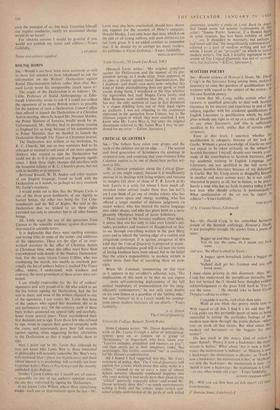CRITICAL QUARTERLY
Sm.—I-he fathers have eaten sour grapes and the teeth of the children are set on edge. . . .' The second and third generation of Scrutineers (to continue in scriptural vein, and assuming that your reviewer John Coleman aspires to be one of them) bear perfect wit- ness to this.
Mr. Coleman complains about the Critical Quar- terly, as one might expect, because it is insufficiently morose in its dealings with living writers, and because its insights fall short of those of F. R. Leavis at his best. Leavis is a critic for whom I have much ad- miration (what serious reader these days has not?), yet I can think aim one of similar talents who has wasted more space and energy scolding, who has offered a larger number of dubious judgments on major writers, who has twisted his native language into odder shapes and who has given birth to a more gloomily Olympian breed of lesser followers.
Those trained in the Scrutiny tradition often think, it seems, that one has only to take over Leavis's atti- tudes, prejudices and naunces of disapproval en bloc to see through everything written in the past thirty years and to inherit the 'cutting edge' of a routine and ubiquitous contempt. It is against arrogance of this kind that the Critical Quarterly is prepared to stand : not with indiscriminate good will to all men (no vows of loving kindness have been taken), but in the belief that the critic's responsibility to modern writers is rather more than that of scotching them on prin- ciple.
When Mr. Coleman, commenting on this view as it appears in my co-editor's editorial, says, 'The implications of this seem to he that we can expect . . . more self-convincing deployments of the full critical vocabulary of commendation for the insig- nificantly contemporary,' he not only casts doubts on his own fitness as a guardian of the 'cutting edge,' but also 'betrays' (it is a Leavis word) his assump- tions about modern literature all too clearly.—Yours faithfully, A. F. DYSON The Critical Qum.terly University College, Bangor, North Wales
[John Coleman writes: 'Mr. Dyson depreciates the work of Dr. Leavis through a series of misrepresen- tations; goes on to conjure up a group of "Scrutineers," or bogeymen, who have taken over "Leavis's attitudes, prejudices and nuances en Noe': and then enrols me in their imaginary ranks. Not surprisingly, this freshly contexted "me" k available for Mr. Dyson's condemnation.
All I hoped I had suggested was this. Mr. Cox's statement of policy. that "The Critical Quarterly will publish few articles which prove that some writer is a failure," seemed to me to carry a note of almost defiant quixotry (decently conducted inquiries into why some writing is had surely have their place in any "critical" quarterly. especially when---and would Mr. Dyson seriously deny this?—so much contemporary writing is had); and the articles under review con- tained ample confirmation of the perils of such willed itenerosity, notably a study of Look Back In Angt.'r that found room for solemn irrelevancies of this order : "Jimmy Porter, however, if a Hamlet figure in some respects, has less basic nobility of mind . . "- etc. It shouldn't be necessary, but perhaps had better add that "the insignificantly contemporary referred to a part of modern writing and not the whole. I know of no "principle" on which to scotch modern writers. The lack I notably registered in niY review of The Critical Quarterly was not of morose' ness, but i i vel ness:—Ed tor, Spectator.]






































 Previous page
Previous page